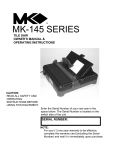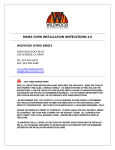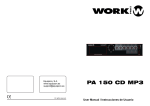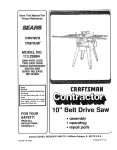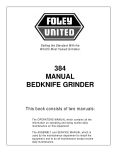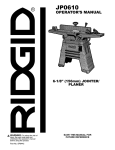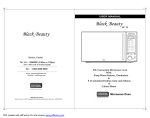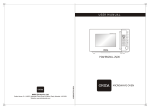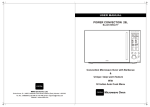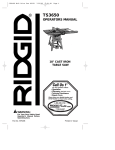Download Manual SCANTOOL 48 BELT and DISC SANDER
Transcript
Industrivej 3-9 DK-9460 Brovst Tel.: +45 98 23 60 88 Fax: +45 98 23 61 44 Manual SCANTOOL 48 BELT and DISC SANDER EC Declaration of Conformity SCANTOOL A/S Industrivej 3-9 9460 Brovst Denmark Website: www.scantool-group.com Tlf: +45 98 23 60 88 Fax.: +45 98 23 61 44 hereby declare that SCANTOOL 48 was manufactured in conformity with the provisions in the COUNCIL DIRECTIVE of 17. May 2006 (2006/42/EC) on mutual approximation of the laws of the Member States on the safety of machines (89/392/EEC as amended by directive 91/368/EEC), with special reference to Annex 1 of the Directive on essential safety and health requirements and Annes 2 93/44/EEC, and directive on low voltage 73/23/EEC, and Directive om electromagnetic compatibility 89/336/EEC with the follewing points EN-50081-1, EN 50082-2, EN61000-3-2 in relation to the construction andmanufacture of machines. 2 Table of Content EC DECLARATION OF CONFORMITY 2 OPERATION 5 1.1 SAFETY RULES FOR STATIONARY POWER TOOLS. 5 2. UNPACKING AND CHECKING CONTENTS 7 3. ASSEMBLY 8 MOUNTING BELT AND DISC SANDER TO WORKBENCH 8 4. CLAMPING BELT AND DISC SANDER TO WORKBENCH 9 5. ASSAMPLY 9 5.1 INSTALLING SANDING DISC AND GUARD 6. INSTALLING WORK SUPPORT 9 9 7. INSTALLING TABLE ASSEMBLY 10 8. ASSEMBLY 11 8.1AUXILIARY MOUNTING FOR VERTICAL SANDING 8.2 SQUARING TABLE ASSEMBLY 8.3 INSTALLING THE SANDING BELTENSIONING AND TRACKING 9. GETTING TO KNOW YOUR BELT AND DISC SANDER 11 11 12 13 9.2 ON-OFF SWITCH 14 10. BASIC OPERATION 15 10.1 BEFORE USING THE SANDER 10.2 BEFORE EACH USE: 15 15 3 10.3 PLAN AHEAD TO PROTECT YOUR EYES, HANDS, FACE, EARS 11. BASIC OPERATION 11.1 BEVEL SANDING 11.2 POSITIONING BELT BED 11.3 SURFACE SANDING ON THE SANDING BELT 11.4 END SANDING ON THE SANDING BELT 11.5 SANDING CURVED EDGES 16 18 18 19 19 20 20 12. BASIC OPERATION 20 13. MAINTENANCE 21 13.1 LUBRICATION 13.2 REMOVING PULLEY COVER AND INSTALLING TIMMING DRIVE BELT 22 22 14. REPAIR PARTS 24 15. REPAIR PARTS 25 . 16. GUARANTEE 26 16.1 GUARANTEE 26 4 Operation 1.1 Safety rules for stationary power tools. Follow them to achieve best results and full benefit from your new machine The very good craftsman respects the tools with which he works. He knows they represent years of constantly improved design. He also knows that they are dangerous if misused. This is the theme of a new safe-use program for stationary power tools. The safety rules are based on approved practices in industrial and home shops. 1. Know your power tool. Read the owner’s manual carefully. Learn its applications and limitations, as well as the specific potential hazards peculiar to this tool. 2. Keep guard in place and in working order. 4. Remove adjusting keys and wrenches. Form habit of checking to see that keys and adjusting wrenches is removed before turning it on. 3. Ground all tools. If tool is equipped with three-prong plug, it should be plugged into a three-hole electrical receptacle. If an adapter is used to accomodate a two-prong receptacle, the adapter wire must be attached to a known ground. Never remove the third prong. 5. Keep work area clean. Cluttered areas and benches invite accidents. 6. Avoid dangerous environment. Don’t use power tools in damp or wet locations or expose them to rain. Keep your work area well lighted. 7. Keep children away. All visitors should be kept in a safe distance from work area. 8. Make workshop kidproof with padlocks, master switches, or by removing starter keys. 5 9. Don’t force tool. It will do the job better and be safer at the rate for which it was designed. 10. Use right tool. Don’t force tool or attachment to do a job it was not designed for. 12. Always use safety glasses. Also use face or dust mask if cutting operation is dusty. Everyday eyeglasses only have impact resistant lenses. They are NOT safety glasses. 14. Don’t overreach. Keep proper footing and balance at all times. 11. Wear proper apparel. Wear no loose clothing, gloves, neckties, rings, bracelets, or other jewelry which may get caught in moving parts. Non-slip footwear is recommended. Wear protective hair covering to contain long hair. 13. Secure works. Use clamps or vise to hold works, when pratical. It’s safer than using your hands and it frees both hands to operate tool. 16. Disconnect tools before servicing and when changing accessories such as grinding wheels, polishing mops, grinding belts, blades, bits, cutters, etc. 15. Maintain tools with care. Keep tools sharp and clean for best and safest performance. Follow instructions for lubricating and changing accessories. 17. Reduce the risk of unintentional starting. Make sure switch is in off position before plugging in. 18. Use recommended accessories. Consult owner’s manual for recommended accessories. Use of improper accessories may cause risk of injury to persons. 6 2. Unpacking and checking contents TOOLS NEEDED Separate all parts from packing materials and check each item with illustration and “Table of Loose Parts”. NOTE: Make certain all items are accounted for, before discarding any packing material. WARNING: To avoid injury, if any parts are missing, do not attempt to assemble the Belt and Disc Sander, plug in the power cord, or turn the switch on until the missing parts are obtained and installed correctly. WARNING: For your own safety, never connect plug to power source outlet, or insert switch key until all assembly steps are complete and until you have read and understood the entire owners manual. ITEM A B C D E F G H TABLE OF LOOSE PARTS Belt and Disc Sander Assembly Owner´s Manual Table Sanding Disc Table Support Guard Disc Work Support Bag Assembly Containing the following parts: Knob Washer, 6.5 x 17.8 x 1.6 Screw, Pan Hd. TY” AB” M4.2 x 1.9-12 Switch key Lockwasher, Ext. M6 Scale Label Screw, Hex Hd. M6 x 1.0-14 QTY 1 1 1 1 1 1 1 1 5 2 1 4 1 4 7 3. Assembly 3.1 Mounting belt and disc sander to workbench If belt and disc sander is to be used in a permanent location, it should be fastened securely toa firm supporting surface such as a workbench. If mounting to a workbench, holes should be drilled throung supporting surface of the workbench using dimensions illustrated. 1. The unit should be bolted securely using 5/16” screws and hex nuts (not included). Screw length should be 1.1/2” plus the thickness of the bench top. 2. Locate and mark the holes where belt and disc sander is to be mounted. 3. Drill (2) 3/8” diameter holes through workbench. 4. Place belt and disc sander on workbench aligning holes on base with holes drilled in workbench. 5. Insert two 5/16” screws and tighten hex nuts. An altemate method of mounting is to fasten belt and disc sander to a mounting board. The board should be of sufficient size to avoid tipping of sander while in use. Any good grade of plywood or chipboard with a ¾” minimum thickness is recommended. (Thinner chipboard can break.) CAUTION: To avoid injury from tool movement, use 5/16” or larger screws and nuts. 1. Follow instructions for mounting to workbench, substituting a board 18” x 24” minimum t size and using 5/16” inch flat head screws, lockwashers, and hex nuts (not included). Screw length should be 1-1/2” plus the thickness of the mounting board. NOTE: For proper stability, holes must be counter sunk so screw heads are flush with the bottom surface of supporting board. CAUTION: To avoid injury from tool movement, supporting surface where belt and disc sander is mounted should be examined carefully after mounting to insure that no movement during use can result. If any tipping or walking is noted, secure workbench or supporting surface before operating belt and disc sander. 8 4. CLAMPING BELT AND DISC SANDER TO WORKBENCH The belt and disc sander can be clamped directly to a workbench using two (2) or more “C” clamps on base of unit (one clamp on each end of unit). 5. ASSAMPLY 5.1 Installing sanding disc and guard 1. Locate sanding disc and peel backing from disc. Align perimeter o disc with plate and press disc firmly into position all the way around. 2. Locate disc guard and two pan head screws, M4.2 x 1.4-12, from loose parts bag. 3. Position disc guard against lower 1/3 of disc aligning holes as shown. 4. Using Phillips type screwdriver, fasten the pan head screws securely applying slight pressure to thread the holes. 6. INSTALLING WORK SUPPORT 1. locate work support and hex screw M6 x 1.0-14, washer and lockwasher. 2. Hold work support into position and fasten as shown. Do not overtighten. 9 7. INSTALLING TABLE ASSEMBLY 1. Locate table support and (3) hex head screws, M6 x 1.0-14, washer and lockwashers among loose parts. 2. Position table support against table, aligning holes as shown. 3. Fasten table support to table as shown. 4. Locate washer 6.5 x 17.8 x1.6 and knob among loose parts. 5. Position table support in corresponding holes on side of base as shown. Make sure the 9.5mm diameter index pin aligns with upper hole. 6. Place washer on threaded shaft of knob and insert through slot into threaded holes of base. WARNING: To avoid trapping the work or fingers between the table and sanding surface, the table edge should be a maximum of 1/16 inch from sanding surface. 7. Loosen the (3) hex head screws and adjust table. 10 8. Use your Owner´s Manual as a spacer. Place ten pages of the Owner´s Manual between the Dise and the front edge of the table. Hold the table against the manual and tighten the three (3) Hex Washer Head screws. 8. ASSEMBLY 8.1Auxiliary mounting for vertical sanding 1. Remove backstop lock bolt and remove work support. 2. Remove table assembly by removing table lock knob and washer. NOTE: Belt bed may be raised to vertical position by loosening hex socket screw and raising bed. See “Positioning Belt Bed” on page 19 3. Attach table assembly to auxiliary holes in belt bed. Make sure index pin is in the upper hole when sanding table is in the vertical position. 8.2 SQUARING TABLE ASSEMBLY WARNING: To avoid injury from accidental start, make sure tool is unplugged before aligning. 1. Using a combination square, check the angle of the worktable with the disc. NOTE: The combination square must be “true” –See “Unpacking – Tools Needed” section on page 7 for checking method. 2. If the table is not 90* with the disc, loosen table lock knob screw and tilt table. 3. Adjust worktable square to the disc and retighten table lock knob. 4. Attach scale label to 0* mark on dust guard. 11 8.3 INSTALLING THE SANDING BELTENSIONING AND TRACKING WARNING: To avoid injury from accidental start, turu switch “OFF”, remove key and remove plug from power source outlet before removing or installing sanding belt On the smooth side of the sanding belt, you will find a “directional arrow” The sanding belt must run in the direction of this arrow so that the splice does not come apart 1. Slide tension lever to the right to release the belt tension 2. Place the sanding belt over the drums with the directional arrow pointing as shown. Make sure the belt is centered on both drums. 3. Slide tension lever to the left to apply belt tension. 4. Tighten hex socket screw when is in desired position. 5. Plug in the power cord. Turn switch “ON” and immediately “OFF”, noting if the belt tends to slide off the idler drum of drive drum. If it did not tend to slide off, it is TRACKING properly. 6. If the sanding belt moves toward the disc, turn the tracking knob clockwise ¼ turn. 7. If the sanding belt moves away from the disc, turn the tracking knob counterclockwise ¼ turn. 8. Turn switch “ON” and immediately “OFF” again, noting belt movement. Readjust tracking knob if necessary. 12 9. GETTING TO KNOW YOUR BELT AND DISC SANDER WARNING: To avoid injury from accidental start, turn switch “OFF” and remove plug from power source outlet before making any adjustments. 1. Work Support. Supports the workpiece on the sanding belt. 2. Hex socket head screw. Loosening screw allows belt bed to be raised to the vertical position. 3. Tracking knob. Turning knob counterclockwise causes sanding belt to move towards the disc; turning knob clockwise causes sanding belt to move away from the disc. 4. Tension lever. Sliding lever to the right releases the sanding belt tension; sliding lever to the left applies belt tension. 5. Table Lock Knob. Loosening knob allows the worktable to be tilted for bevel sanding (Scale pointer on table trunnion; scale attached to base.) 6. Auxiliary Mounting Hole. Allows table assembly to be mounted for end sanding when the bed is placed in vertical position 7. On-Off Switch 13 9.2 ON-OFF SWITCH The On-Off switch has a locking feature. THIS FEATURE IS INTENED TO HELP PREVENT UNAUTHORIZED AND POSSIBLY HAZARDOUS USE BY CHILDREN AND OTHERS. 1.To turn machine “ON” insert key into switch. NOTE: Key is made of yellow plastic, located in loose parts bag. 2. Insert finger under switch lever and PULL end of switch out. 3. To turn machine “OFF”…….PUSH lever in. NEVER LEAVE THE MACHINE UNATTENED UNTIL IT HAS COME TO A COMPLETE STOP. 4. To lock switch in OFF position…. Hold switch IN with one hand …. REMOVE key with other hand. WARNING: For your own safety, always lock the switch “OFF” when machine is not in use….. remove key and keep it in a safe place…. also in the event of a power failure(all of your lights go out) turn switch off…Remove the key and store it remote from belt and disc sander. 14 10. BASIC OPERATION 10.1 BEFORE USING THE SANDER WARNING: To avoid mistakes that could cause serious, permanent injury, do not plug the sander in until the following steps are completed. · · · · Assembly and alignment. (See pages 9-13) Learn the use and function of the ON-OFF switch, table and work table tilt lock knob. (See pages 14-15) Review and understand all safety instructions and operating procedures in this manual. Review of the maintenance methods for this sander. (See pages 22-23) 10.2 BEFORE EACH USE: Inspect your sander. DISCONNECT THE SANDER. To avoid injury from accidental starting, unplug the sander, turn the switch off and remove the switch key before changing the setup, sanding disc or belt or adjusting anything. CHECK DAMAGED PARTS. Check for: · · · · · · · · Alignment of moving parts. Binding of moving parts. Broken parts Worn parts that cause a gap larger than 1/16” between work support and sanding surface. Sanding belt narrower than 4 inches. Narrower belts uncover pats that could trap your fingers. Worn or damaged electric cords. Stable mounting, and Any other conditions that may affect the way the sander works. If any part is missing, bent, or broken in any way, or any electrical parts don`t work properly, turn the sander off and unplug the sander. REPLACE damaged, missing, or failed parts before using the sander again. MAINTAIN TOOLS WITH CARE. Keep the sander clean for best and safest performance. Follow instructions for lubricating. REMOVE ADJUSTING KEYS AND WRENCHES from tool before turning it on. To avoid injury from jams, slips or thrown pieces. · USE ONLY RECOMMENED ACCESSORIES.(See pages 24) Consult this Owner´s manual for recommended accessories. The use of improper accessories may cause risk of injury to persons. 15 · · · Adjust any work support to clear the sanding surface by no more than 1/16 of an inch. When checking clearance between the belt and work support, press the belt flat against the metal beneath if. Make sure all clamps and locks are tight and no parts have excessive play. KEEP WORK AREA CLEAN. Cluttered areas and benches invite accidents. Floor must not be slippery. To avoid bums or other fire damage, never use the sander near flammable liquids, vapors or gases. 10.3 PLAN AHEAD TO PROTECT YOUR EYES, HANDS, FACE, EARS KNOW YOUR SANDER. Read and understand the owner´s manual and labels affixed to the tool. Learn its application and limitations as the specific potential hazards peculiar to this tool. To avoid injury from accidental contact with moving parts: · · · KEEP GUARDS IN PLACE and in working order. Don´t do layout, assembly, or setup work on the sander while any parts are moving AVOID ACCIDENTAL STARTING. Make sure switch is “OFF” before plugging sander into a power outlet. 10.4 Plan your work. USE THE RIGT TOOL. Don´T force tool or attachment to do a job it was not designed to do. Caution: This machine is not designed for heavy deburring operations. When finishing metals, sparks or hot fragments could cause a fire. To avoid this: · · · Disconnect any dust collecting hose from the sander. Remove all traces of wood dust from inside the sander. Remove all traces of metal dust from inside the sander before sanding wood again. 10.5 Dress for safety Any power sander can throw foreign objects into the eyes. This can cause permanent eye damage. Wear safety goggles. Everyday eyeglasses have only impact resistant lenses. They are not safely glasses. Safety goggles are available. · · · · · · Do not wear loose clothing, gloves, neckties or jewelry (rings, wrist watches). They can get caught and draw you into moving parts. Wear nonslip footwear. Tie back long hair. Roll Long sleeves above the elbow. Noise levels vary widely. To avoid possible hearing damage, wear ear plugs or muffs when using sander for hours at a time Sanding operations are usually dusty. Wear a dust mask along with the safety goggles. 16 10.6 Inspect your workpiece Make sure there are no nails or foreign objects in the part of the workpiece to be sanded. Plan your work to avoid THROWBACKS- when the workpiece catches on the sanding belt or disc and is torn from your hands. · · · · · · · · · Make sure there´s no debris between the workpiece and its supports. When sanding irregulary shaped workpieces, plan your work support so it will not slip and be pulled from your hands. Use extra caution with large, very small or awkward workpieces Never use this tool to finish pieces too small to hold by hand. Use extra supports (Tables, saw horses, blocks, ect.) for any workpieces large enough to tip when not held down to the table top NEVER use another person as a substitute for a table extension, or as additional support for a workpiece that is longer or wider than the basic sander table, or to help feed, support, or pull the workpiece. When finishing on the disc, always press the workpiece against the “Down” side of the disc. Sanding against the side coming up from under the table could damage the work by making it “chatter”, or tear the work from your hands and throw it. Sand only one workpiece at a time. Clear everything except the workpiece and related support devices off the table before tuning the sander on. 10.7 Plan the way you will hold the workpiece from start to finish. Avoid awkward operations and hand positions where a sudden slip could cause fingers or hand to move into a sanding surface. Keep fingers away from where the belt goes into the dust trap. DON´T OVERREACH. Keep good footing and balance. Keep your face and body to one side, out of line with a possible throwback. Keep your face and body to one side, out of line with a possible throwback. 10.8 WHENEVER SANDER IS RUNNING Warning: Don´t let familiarlty (gained from frequent use of your belt and disc sander) cause a careless mistake. A careless fraction of a second is enough to cause a severe injury. Before starting your work, watch the sander while it runs. If it makes an unfamiliar noise or vibrates a lot, stop immediately. Turn the sander off. Unplug the sander. Do not restart until finding and correcting the problem. Make sure the sanding disc turns counterclockwise before using the sander. KEEP CHILDREN AWAY. Keep all visitors a safe distance from the sander. Make sure bystanders are clear of the sander and workpiece. 17 DON´T FORCE TOOL. It will do the job better and safer at its designed rate. Press the workpiece against the sanding material only hard enough to let it sand without bogging down or binding. 10.9 Before freeing any jammed material: · Turn switch “OFF”. · Unplug the sander. · Wait for all moving parts to stop. 10.10 BEFORE LEAVING THE SANDER: NEVER LEAVE TOOL RUNNING UNATTENDED. TURN POWER OFF. Don´t leave tool until it comes to a complete stop. MAKE WORKSHOP CHILD-PROOF. Lock the shop Disconnect master switches. Remove the yellow switch key. Store it away from children and others not qualified to use the tool. 11. BASIC OPERATION 11.1 BEVEL SANDING The worktable can be tilted from 0* to 45* for bevel sanding. Loosen the table lock knob and tilt the worktable to desired angle as shown. Retighten table lock knob. WARNING: To avoid trapping the work or fingers between the table and sanding surface, the table should be repositioned on the table support to retain a maximum of 1/16 inch distance between sanding surface and table. 18 11.2 POSITIONING BELT BED A bed locking hex socket head screw locks the belt bed in a vertical or horizontal position. To adjust vertical position: 1. Remove the work support. 2. Loosen the hex socket head locking screw using a 6mm hex wrench. 3. Position belt bed vertically as shown and tighten the hex socket head screw. 11.3 SURFACE SANDING ON THE SANDING BELT Warning: To avoid injury from slips, jams or thrown pleces, adjust the backstop to clear the sanding surface by no more than 1/16 of an inch. When checking clearance between the belt and work support, press the belt flat against the metal beneath it. Hold the workpiece firmly with both hands, keeping fingers away from the sanding belt. Keep the end butted against the backstop and move the work evenly across the sanding belt. Use extra caution when sanding very thin pieces. For sanding long pieces, remove the work support. Apply only enough pressure to allow sanding belt to remove material. 19 11.4 END SANDING ON THE SANDING BELT It is more convenient to sand the ends of long workpieces with sanding belt in a vertical position. See “Basic Operation – Positioning Belt Bed” for adjusting the belt bed, and see “ Assembly – Installing Table Assembly” for adjusting worktable. Move the work evenly across the sanding belt. For accuracy, use a miter gauge ( accessory). 11.5 SANDING CURVED EDGES Always sand inside curves on the idler drum as shown. WARNING: Never attempt to sand the ends of a workpiece on the idler drum. Applying the end of the workpiece to the idler drum could cause the workpiece to fly up and result in a injury. 12. BASIC OPERATION Always sand outside curves on the left side of center on the sanding disc as shown. WARNING: applying the workpiece to the right side of the disc could cause workpiece ti fly up (kickback) and result in an injury. 12.1 SANDING SMALL END SURFACES ON THE SANDING DISC. NOTE: Use of a Miter Gauge (optional accessory) is recommended for this operation. Always move the work across left side of center on the sanding disc face as shown. WARNING: Applying the workpiece to the right side of the disc first could cause workpiece to fly up (kickback, and result in an injury 20 WARNING: For your own safety, turn switch “OFF” and remove plug from power source outlet before adjusting your sander. NOTE: Use a combination square to square the miter gauge to the face of the disc (combination square must be “true” – See “”Unpacking – Tools Needed” section on page 6 for checking this method). If it is not square, loosen the miter gauge knob and move the miter gauge slightly until it is square. Without moving the miter gauge, tighten the knob securely. Always position the workpiece to left of center on sanding disc with disc rotating counterclockwise as shown. The table may be tilted for bevelled work. 13. MAINTENANCE WARNING: For your own safety, turn switch “OFF” and remove plug from power source outlet before adjusting, maintaining, or lubricating your belt and disc sander. WARNING: To avoid electrocution or fire, any repairs to electrical systems should be done only by qualified service technicians. Unit must be reassembled exactly to factory specifications. If power cord is worn or cut, or damaged in any way, have it replaced immediately. Frequently blow out or vacuum out any dust that may accumulate inside the motor. A coat of automobile-type wax applied to the worktable will make it easier to feed the work while finishing. Do not apply wax to the abrasive belt table because the belt could pick up the wax and deposit it on the pulleys, causing the belt to slip. 21 13.1 LUBRICATION The BALL BARINGS in this machine are packed with grease at the factory. They require no further lubrication. Sleeve bearings should be lubricated with 30 weight oil or equivalent after each 10 hours of operation – see instructions below. OILING SLEEVE BEARINGS. Warning: To avoid injury, turn switch “OFF”, remove key and remove plug from power source outlet before oiling unit. 1. Release belt tension by sliding the tension lever to the right. 2. Move the sanding belt slightly to either side of the idler drum to expose the oval shaped oiling hole. 3. Apply two to three drops of oil in the hole on each side as shown. Do not apply more than three drops of oil. Too much oil can cause belt to slip, and oil may get on workpiece. 4. Adjust belt tracking as described in the Assembly instructions under the heading “Installing the Sanding Belt – Tensioning and Tracking” 13.2 REMOVING PULLEY COVER AND INSTALLING TIMMING DRIVE BELT 1. Using a Philips screwdriver, remove the flat head screw located in the middle of the cover. 2. Remove the cover. 3. Loosen (3) screws to allow pulleys to shift enough to place belt around them. Place belt around motor pulley and drive pulley as shown if belt is ever broken. 22 4. Slightly tighten (3) screws. Adjust tension of belt by putting blade screwdriver in adjusting hole. Push up on screwdriver to tighten tension between pulleys. 5. Tighten screws being careful not to disturb belt. 6. Test belt tension by placing fingers on either side of belt and squeeze. There should be about a 1/4” give to the belt. NOTE: Excessive tightness on pulley belt may cause increased noise and over load motor. Excessive looseness on pulley belt may cause belt to fail prematurely. 13.3 INSTALLING PULLEY COVER 1. Locate the pulley cover and position it inside the relief edges of pulley housing. 2. Using a Philips screwdriver, reinstall and tighten the flat head screw. 23 14. REPAIR PARTS 24 15. REPAIR PARTS Key No. 1 2 3 4 5 6 7 8 9 10 11 12 13 14 15 16 17 18 19 20 21 22 23 24 25 26 27 28 29 30 31 32 33 34 Description Knob Washer, Rubber Washer, Notched Bed Screw, flat cross M5 x 0.8-35 Screw, Hex M6 x 1.0-14 Lockwasher, Ext. M6 Washer, 6.5 x 17.8 x 1.6 Support, Work Belt, Sanding 4” x 36” Lockwasher, Helical M5 Screw, Pan Hd M5 x 0.8-8 Drum, Drive Screw, socket set, M8 x 1.25-10 Cap, Bearing Bearing w/Felt Washer Spacer, Bearing Housing switch Lockwasher, Ext. M5 Screw, Pan Hd. M5 x 0.8-16 Key, switch Switch, Locking Lead Screw, pan cross – Type “AB”M4.2 x1.4-30 Cover, Switch Box Relay Pad, 6” Sandpaper Screw, Pan cross M6 x 1.0-12 Lockwasher, Hilcal M6 Disc Screw, Pan Hd Type “AB” m4.2 x 1.4-12 Guard, Disc Shroud, Disc Collector, Dust Key No. Description 35 36 37 38 39 40 41 42 43 44 45 46 47 48 49 50 51 52 53 54 55 56 57 58 Table Support, Table Lable, Scale Cord w/plug Motor (1/3 HP) Connector, wire Nut, Hex M6 x 1.0 Base Belt, Timing drive Screw, flat cross M5 x 0.8-10 Washer, countersink Pulley, drive Screw, pan Hd. M6 x 1.0-25 Washer, M6 x 12 x 1.6 Pulley, Drive Screw, flat Hd. M5 x 0.8-25 Support, Bearing Cover, Belt Support, Bed Nut, square M8 x 1.25 Bumper, Rubber Screw, Hex soc. CapM8 x 1.25-25 Bearing, Ball Ring, Retaining M12 59 60 61 62 63 64 65 Shaft, Drive Nut, Hex Flange M5 x 0.8 Spacer, Guide Spring, Index Guide, Drum Shaft, Idler Drum, Idler 66 67 68 69 _ Lever, Tension Spring, Tension Spacer, Lever Washer, M5 x 15 x 1.2 Owner´s Manual(Not Illus.) 25 . 16. 16.1 Guarantee Guarantee If within 2 year of purchase this machine supplied by SCANTOOL A/S becomes defective due to faulty materials or workmanship we guarantee to repair or replace the machine or defective part or parts free of charge provided that: 1. The product is returned complete to one of our Service Branches or Official Service Agents. 2. The product has not been misused or carelessly handled and in particular has not been used in a manner contrary to the operating instructions. 3. Repairs have not been made or attempted by other than our own Service Staff or the staff of our Official Service Agents. 4. Documentary proof of purchase date is produced when the goods are handed in or sent for repair. 5. Wear parts are not covered by the warranty SCANTOOL A/S offers you five years guarantee on the electrical motor if the motor becomes defective or even burns-out within the first 5 years from date of invoice. 26





























